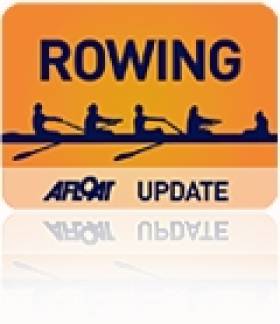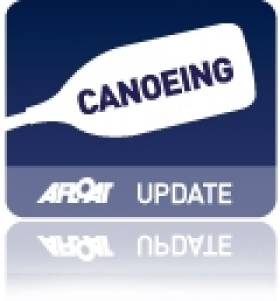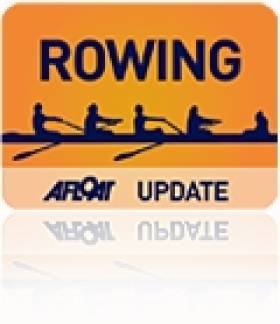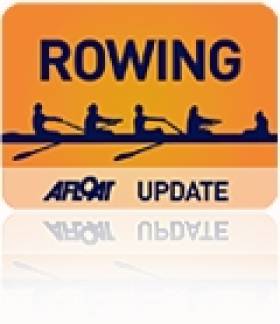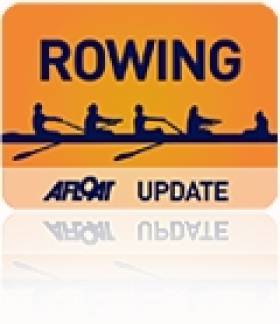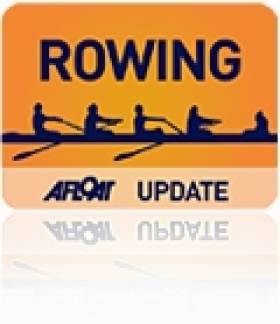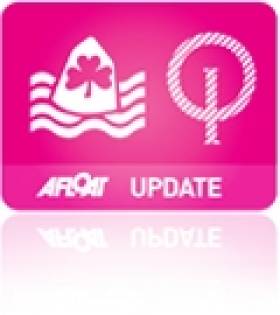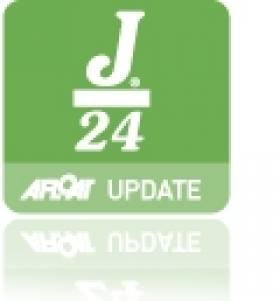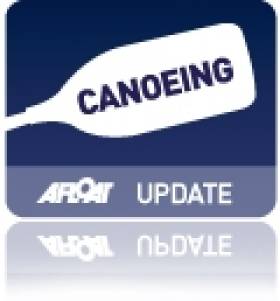Displaying items by tag: World Championships
Shinnick and Jacques Win B Final at World Junior Rowing
#WorldJuniorRowing: Ireland’s campaign at the World Junior Rowing Championships ended on a good note, as Bridget Jacques and Hilary Shinnick won the B Final of the women’s double sculls. The host country, Lithuania led through the 500-metre mark, but Ireland soon took up the lead and, with a very high stroke rate, maintained it to the finish. Lithuania were second and Croatia third.
Jack Casey and Andy Harrington fought hard to win their D Final of the double sculls but had to settle for second (20th overall). Bulgaria led through 500 metres and halfway, but the Ireland crew caught them in the final quarter, only for their rivals to regain the lead with a sprint in the final 150 metres.
The Ireland men’s quadruple finished sixth in their C Final, 18th overall. In a race won well by Romania, with Ukraine a clear second, Ireland stayed in touch with the four chasing boats, disputing fifth with Japan in the final quarter.
World Junior Rowing Championships, Trakai, Lithuania, Day Five (Selected Results, Irish interest)
Men
Quadruple Sculls – C Final (Places 13 to 18): Romania 6:02.52, 2 Ukraine 6:04.50, 3 Belarus 6:06.78, 4 Denmark 6:06.94, 5 Japan 6:08.13, 6 Ireland (C Carmody, J Mitchell, D O’Malley, P Hegarty) 6:09.62.
Double Sculls – D Final (Places 19 to 24): 1 Bulgaria 6:39.15, 2 Ireland (J Casey, A Harrington) 6:40.35, 3 Estonia 6:48.32, 4 Ukraine 6:49.12, 5 Mexico 6:49.48, 6 Croatia 6:52.35.
Women
Double Sculls – B Final (Places 7 to 12): 1 Ireland (H Shinnick, B Jacques) 7:14.52, 2 Lithuania 7:16.60, 3 Croatia 7:18.13, 4 Belarus 7:22.75, 5 Slovenia 7:26.81, 6 Austria 7:30.03.
Ireland Junior Canoeists Get First Taste of World Championships Fare
# CANOEING: Ireland’s three junior competitors all completed the testing course on the river Tiber in Rome at the Canoe Marathon World Championships today. Sean McCarthy took 22nd place in the junior K1, and Mark Hartnett 32nd. Cait Broderick took 21st in the women’s event.
Ireland’s senior competitors, Jenny and Peter Egan, will compete tomorrow.
In the Masters events, which preceded the World Championships, Malcolm Banks finished fourth and Deaglan O Drisceoil fifth.
Canoe Marathon World Championships – Day One (Irish interest)
Men, Junior K1: 1 Hungary (A Petro) 1:33:52.350; 22 S McCarthy 1:42.35.870; 32 M Hartnett 1:50:08.080
Women, Junior K1: 1 Hungary (T Takacs) 1:23.42.420; 21 C Broderick 1:36:34.930.
O'Donovan Wins C Final to Place 13th at World Rowing Championships
# ROWING: Paul O’Donovan made up somewhat for missing out on a place in the A/B Semi-Finals of the junior single sculls at the World Rowing Championships when he won the C Final with a dominant performance in Plovdiv in Bulgaria today. The Skibbereen man, who was fourth last year in this event, was less than a tenth of a second off making the A/B semi-finals on Friday, but he left nothing to chance today and won well, placing him 13th in the overall rankings. His only test came from Leonard van Lierop of the Netherlands, who led early on and challenged again at the finish.
Niall Kenny made a serious bid for second place in the C Final of the lightweight single sculls. The race was won well by Germany’s Daniel Lawitzke, with Brazil’s Ailson Silva and Kenny fighting it out behind him. Silva clung on by .1 of a second, giving him 14th, while Kenny finished 15th overall.
In a two-boat D Final of the men’s lightweight pair, Mark O’Donovan and Anthony English could not best Chinese teenagers Zhiyuan Zhang (18) and Fengjian Qi (17). Ireland thus finish 20th in this class.
Kate O’Brien finished fifth in an interesting race in the D Final of the junior single sculls. The 17-year-old fought it out for third with Lisa Hirtenlehner of Austria for over a thousand metres, but the final quarter saw the Austrian push on – she took second in a photo finish with Chile’s Natalia Sanchez Rojas – while O’Brien was caught by Tunisia’s Racha Soula.
World Championships, Plovdiv, Bulgaria, Day Four (Irish interest)
Men
Lightweight Pair – D Final (Places 19, 20): 1 China 6:58.36, 2 Ireland (M O’Donovan, A English) 7:01.31.
Junior Pair – Semi-Final One (First Three to A Final, rest to B Final): 1 Romania 6:43.22, 2 Germany 6:45.36, 3 Greece 6:46.74; 4 Ireland (C Black, J Cassells) 6:50.66, 5 Poland 6:57.67, 6 Belgium 7:49.61.
Lightweight Single Scull – C Final (13 to 18): 1 Germany 7:09.58, 2 Brazil 7:11.88, 3 Ireland (N Kenny) 7:11.98, 4 Hong Kong 7:13.43, 5 Peru 7:14.38, 6 Japan 7:18.57.
Junior Single Sculls – C Final (Places 13-18): 1 Ireland (P O’Donovan) 7:10.99, 2 Netherlands 7:15.27, 3 Austria 7:21.98, 4 Zimbabwe 7:23.33, 5 United States 7:24.26, 6 Belgium 7:37.43.
Women
Junior Quadruple – B Final (Places 7 to 12): 1 Britain 6:42.64, 2 China 6:45.37, 3 Greece 6:47.28, 4 Australia 6:47.80, 5 Czech Republic 6:51.05, 6 Ireland (K Cromie, H Shinnick, B Jacques, B Walsh) 6:52.07.
Junior Single Sculls – D Final (Places 19 to 24): 1 Russia 8:11.28, 2 Austria 8:13.99, 3 Chile 8:13.99, 4 Tunisia 8:18.17, 5 Ireland (K O’Brien) 8:19.09, 6 Bulgaria 8:24.66.
Ireland Junior Pair Fourth in Pacey World Rowing Semi-Final
# ROWING: The Ireland junior pair of Chris Black and Joel Cassells finished fourth in a pacey semi-final at the World Rowing Championships in Plovdiv in Bulgaria this morning and will compete in tomorrow’s B Final.
The Coleraine men lived with the hot pace until the third quarter, when Germany pushed the Irish out of the third qualification spot in a race dominated by Romania. The big German crew then passed Greece, who had held second, and even threatened Romania at the finish. Romania, Germany and Greece were all inside the time of Hungary, who won the second semi-final.
The Ireland women’s junior quadruple scull of Katie Cromie, Hilary Shinnick, Bridget Jacques and Bernadette Walsh finished found themselves sixth at the end of their B Final (12th overall) after a race in which they reached as high a position as fourth at 1250 metres. Australia and the Czech Republic eventually took fourth and fifth, behind winners Britain, who led in China and Greece.
World Championships, Plovdiv, Bulgaria, Day Four (Irish interest)
Men
Junior Pair – Semi-Final One (First Three to A Final, rest to B Final): 1 Romania 6:43.22, 2 Germany 6:45.36, 3 Greece 6:46.74; 4 Ireland (C Black, J Cassells) 6:50.66, 5 Poland 6:57.67, 6 Belgium 7:49.61.
Women
Junior Quadruple – B Final (Places 7 to 12): 1 Britain 6:42.64, 2 China 6:45.37, 3 Greece 6:47.28, 4 Australia 6:47.80, 5 Czech Republic 6:51.05, 6 Ireland (K Cromie, H Shinnick, B Jacques, B Walsh) 6:52.07.
# ROWING: Ireland’s two junior single scullers showed plenty of heart but could not quite make the A/B semi-finals at the World Rowing Championships in Plovdiv this morning.
Paul O’Donovan missed out by less than a tenth of a second in his quarter-final. The Skibbereen man lay in fifth and well off qualification at halfway. However, he mounted his customary mighty push in the second half of the race and caught up with third-placed Pilip Pavukou of Belarus. The Belarussian fought back and retained third place by .9 of a second at the finish. Azerbaijan and Germany filled the first two places. O’Donovan, who had been fourth in this discipline last year, is now set for the C/D Semi-Finals.
Kate O’Brien, making her debut at these Championships, fought bravely in her race and was in a good fourth place with 500 metres to go. But the race got away from the 17-year-old St Michael’s woman in the final quarter and she finished fifth. Romania, Sweden and Poland took the three qualification places and Russia was fourth.
World Rowing Championships, Plovdiv, Bulgaria – Day Three (Irish interest)
Men
Junior Pair – Repechage Four (First Two to A/B Semi-Final; rest to C/D Semi-Final): 1 Ireland (C Black, J Cassells) 6:53.11, 2 Czech Republic 6:53.55; 3 Spain 6:56.80, 4 Ukraine 7:19.31, 5 Denmark 7:28.63.
Junior Single Sculls – Quarter-Final Two (First Three to A/B Semi-Final; rest to C/D Semi-Final): 1 Azerbaijan 7:08.77, 2 Germany 7:11.13, 3 Belarus 7:12.37; 4 Ireland (P O’Donovan) 7:12.46, 5 Austria 7:27.00, 6 Denmark 7:34.99.
Women
Junior Single Sculls – Quarter Finals (First Three to A/B Semi-Final; rest to C/D Semi-Final): 1 Romania 8:02.92, 2 Sweden 8:07.68, 3 Poland 8:09.84; 4 Russia 8:13.92, 5 Ireland (K O’Brien) 8:17.69, 6 Tunisia 8:29.53.
Ireland Pair Wins Exciting Repechage at World Rowing Championships
# ROWING: Ireland won its first race at the World Rowing Championships in Plovdiv in Bulgaria this morning – and in impressive fashion too. The junior pair of Chris Black and Joel Cassells are much better than their fourth place in the heats on Thursday suggested – they received their A Level Results that day – but they still had to finish in the top two in today’s repechage if they were to progress to the A/B Semi-Finals. They got a splendid start and led to halfway. Spain, who had been the closest crew to Black and Cassells, were passed by the Czech Republic in the third quarter and Michael Humpolec and Michal Novy drew alongside the Irish in the final 300 metres and looked set for the win. However, Black and Cassells, the Ireland senior champions in the pair, finished as they had started and won the sprint to the line.
World Rowing Championships, Plovdiv, Bulgaria – Day Three (Irish interest)
Men
Junior Pair – Repechage Four (First Two to A/B Semi-Final; rest to C/D Semi-Final): 1 Ireland (C Black, J Cassells) 6:53.11, 2 Czech Republic 6:53.55; 3 Spain 6:56.80, 4 Ukraine 7:19.31, 5 Denmark 7:28.63.
Ireland to Showcase 'Planet's Biggest Waves' on 2012 Kite Surf Tour
#KITESURFING - Ireland will be one of four stops on the 2012 Kite Surf Pro World Championship Tour to decide the best wave kitesurfers in the world, Surfer Today reports.
Kicking off in Cascais, Portugal in June before heading to Mauritius in September, the tour will come to Ireland's west coast - described as "Europe's secret kite surfing jewel and home to one of the planet's biggest waves" - from 19-28 October.
According to Surfer Today: "Ireland's Kite Surf Pro will incorporate a unique mobile format, capable of showcasing each day's action at the choicest of locations on the country's wild and swell-abundant west coast."
The tour will wrap up in Maui, Hawaii from 29 November to 8 December, where the €15,000 prize purse wil be up for grabs at the famed surfing venue of Ho'okipa.
Surfer Today has more on the story HERE.
Sophie Drops to 16th After Six Races in New Zealand
#optiworldsnz –Sailing for Ireland, Sophie Browne of Tralee Bay Sailing Club has dropped from 7th to 16th overall after six races sailed at the Optimist World Championships, according to provisional results from organisers this morning. Browne scored a 16th in race six of the 210–boat fleet to place 16th overall. Significantly though the top Irish sallor is on equal points with 14th place and only seven points off the top ten, still very much in contention. Only 10 points separate 11 of the top 16 boats in the fleet with a further discard in hand and everything to play for. It is the first time Ireland has contested the World championships in four years, Irish efforts have been previously concentrated on the European championships.
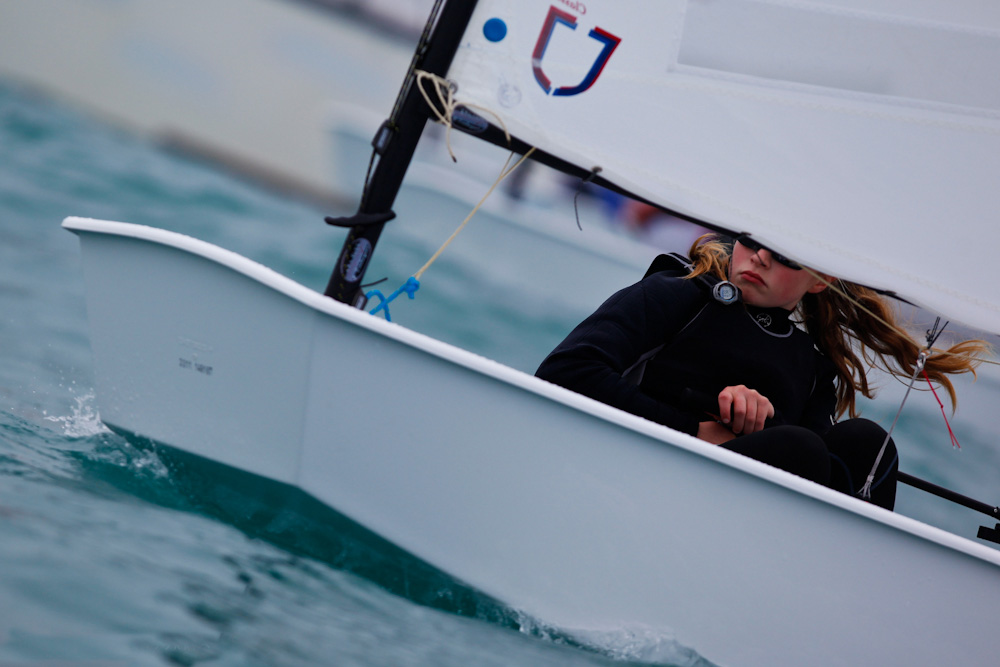
Sophie on day three of the Oppy worlds in Napier. Photo: Matias Cappizzano
Today, the third day of racing at the Optimist World Championships, the breeze was light and variable and when the race officer got proceedings underway it was 5 to 7 knots of wind. Although the conditions did not suit Sophie very much, she has still managed to maintain a consistent performance on a very challenging day for her.
The usual local wind pattern has not materialised in the past few days and the temperature has been lower than usual with rain and cloud cover. The land has not heated up enough to generate sufficient convection to establish a sea breeze.
The wind shifted and dropped making conditions very difficult at times. Sophie had been in 7th place overall on the leader board overnight after 2 days of the event, but despite a difficult start she managed to claw her way back to 12th place at the winward mark and held on to her place to the wing mark, she then improved and gained a few more places on the last beat to the finish line when the wind dropped off further before shifting and favouring the opposite side of the track.
Sophie finished 16th in the only race today and now lies 16th overall for the championship after one discard.
She continues to sail with consistency which may assist her in the overall standings at the end of the regatta. She has placed in the top 20, out of 210 boats competing, in every one of her 6 races so far in this event.
The next two days are for team racing only followed by a lay day and Sophie's next race will be on Saturday when the last 3 days of fleet racing starts.
More results as we have them. Day two vid below where Sophie gets vertiable mention for her strong wind technique.
J24 World Champs for Howth in 2013
#J24–Howth Yacht Club will stage the J24 World Championships from 22nd to 30th August 2013. This follows the successful staging of the class European championships at the club in September. Irish boats will be required to qualify for the event.


























